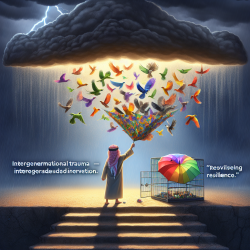Understanding Adverse Childhood Experiences (ACEs) and Their Impact
Adverse Childhood Experiences (ACEs) have long been a focal point in understanding the long-term effects of childhood trauma on health and development. The seminal ACEs study by Felitti et al. highlighted the profound implications of childhood adversities such as abuse, neglect, and household dysfunction on adult health outcomes. As research has evolved, it has become evident that ACEs not only affect individuals but can have intergenerational impacts, influencing the development of subsequent generations.
The Intergenerational Transmission of Trauma
Intergenerational trauma refers to the transmission of trauma effects from one generation to the next. This transmission can occur through biological, psychological, and social pathways. For instance, maternal ACEs have been linked to altered stress responses in offspring, affecting their development even before birth. These changes can manifest as developmental delays, behavioral issues, and emotional problems in children.
Embracing a Resilience Framework
While the negative impacts of ACEs are well-documented, a growing body of research emphasizes the importance of resilience. Resilience is the capacity to adapt positively despite adversity. It is a dynamic process influenced by various factors, including individual traits, family support, and community resources. Practitioners can leverage this framework to foster resilience in children exposed to ACEs.
Strengths-Based Interventions: A Pathway to Healing
Strengths-based interventions focus on enhancing the inherent strengths of individuals and communities to promote healing and positive outcomes. These interventions are crucial in addressing intergenerational trauma. By emphasizing resilience and adaptive functioning, practitioners can help break the cycle of trauma transmission.
- Individual Level: Encourage the development of problem-solving skills and self-esteem in children.
- Family Level: Strengthen parenting capacities and foster secure attachments between caregivers and children.
- Community Level: Build supportive community networks and safe environments for children to thrive.
Implementing Research-Based Interventions
Practitioners can benefit from implementing research-based interventions that address the multifaceted nature of ACEs. Programs like the Pregnant Moms’ Empowerment Program (PMEP) have shown promise in reducing re-victimization and improving developmental outcomes for children. These interventions highlight the importance of addressing both individual and systemic factors to promote resilience.
Encouraging Further Research and Practice
To effectively support children and families affected by ACEs, practitioners should engage in ongoing research and professional development. By staying informed about the latest findings and best practices, they can better tailor interventions to meet the unique needs of each child and family.
To read the original research paper, please follow this link: Charting a Course towards Resilience Following Adverse Childhood Experiences: Addressing Intergenerational Trauma via Strengths-Based Intervention.










